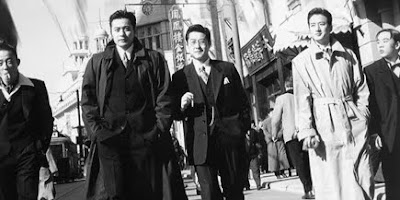
At first you might puzzle over the singularity within this movie's title. Why Friend instead of Friends? After all, this pic is about a quartet of boys whom we watch mature from adolescence to adulthood. But as the cinematic years (and the real-time minutes) roll by, you realize there's only one relationship that counts to writer-director Kwak Kyung-taek: The one between Sang-taek (Seo Tae-hwa), a cowardly nerd who goes on to earn his PhD, and Jeong-suk (Yu Oh-seong), the son-of-a-thug who becomes a thug himself. The other two pals -- Dong-su (Jang Dong-gun) and Jeong-ho (Jeong Un-taek) -- are there for local color. At least in theory. The catch is that the camera adores Yu, who practically makes the screen burn, and doesn't care about Seo, who fades into the background, like a set piece. For all I know that could've been writer-director Kwak Kyung-taek's intent. Since the film is semi-autobiographical, maybe he finds the more conventional middle-class life less thrilling than the dangerous and violent world of Jeong-suk and his sidekick Dong-su, the undertaker's son who ends up a formidable gangster himself.
The life of crime has more action, whether it's fighting with a crowd of high school kids while using anything within reach as your weapon, or giving a knifing master class that addresses both tools and methodology. Blood spills in movie theaters, back rooms, restaurants, karaoke clubs, and rainy streets. But the cruel impact of the mob's dog-eat-dog ethic is ancillary here as the fragile kinship between Jeong-suk and Dong-su ultimately says more about Jeong-suk's friendship with Sang-taek than anything else. Which isn't a bad thing. There's a certain satisfaction that comes with Dong-su getting repeatedly dismissed, belittled and humbled then watching him rise in power in Busan's ruthless underworld where he ends up Jeong-suk's rival. I was particularly taken with how Jeong-suk holds on to the past and wants to minimize their rivalry while Dong-su seems to embrace it, to heighten the tension. Old grudges die hard for those who get the short end of the stick -- which can be used to knife you.



 You can always count on a little bit of crazy in a Kim Ki-duk film. Here in The Coast Guard, you get a double dose via PFC Kang (a somewhat embarrassing Jang Dong-gun) and civilian local girl Mi-Yeong (an ultimately disappointing Park Ji-a), who are practically in a competition to see who can out-kook the other: He's irrationally obsessed with killing a North Korean spy; she's drunkenly reckless about getting banged by her boyfriend Young-gil across the forbidden border. And that's when they're at their most sensible! Once they both get what they want -- in a twisted way, naturally -- as Kang shoots her lover in a fatal instance of coitus interruptus, the two officially go off the deep end. He keeps thinking that he's still in the army although he's been discharged for being mentally unfit. She starts having sex with any man in a uniform, none of whom mind a bit that she's freakily damaged goods. Aside from his former comrade (Kim Jeong-hak) and her loyal brother (Yu Hae-jin), no one appears overly sympathetic towards their descents into madness. Insanity is tedious. Best to steer clear in case derangement is contagious!
You can always count on a little bit of crazy in a Kim Ki-duk film. Here in The Coast Guard, you get a double dose via PFC Kang (a somewhat embarrassing Jang Dong-gun) and civilian local girl Mi-Yeong (an ultimately disappointing Park Ji-a), who are practically in a competition to see who can out-kook the other: He's irrationally obsessed with killing a North Korean spy; she's drunkenly reckless about getting banged by her boyfriend Young-gil across the forbidden border. And that's when they're at their most sensible! Once they both get what they want -- in a twisted way, naturally -- as Kang shoots her lover in a fatal instance of coitus interruptus, the two officially go off the deep end. He keeps thinking that he's still in the army although he's been discharged for being mentally unfit. She starts having sex with any man in a uniform, none of whom mind a bit that she's freakily damaged goods. Aside from his former comrade (Kim Jeong-hak) and her loyal brother (Yu Hae-jin), no one appears overly sympathetic towards their descents into madness. Insanity is tedious. Best to steer clear in case derangement is contagious!


